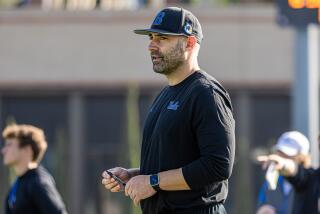Murdock Won’t Be Left Out Again
- Share via
PROVIDENCE, R.I. — Failure has been stalking Eric Murdock for how long now? Since February of 1990, when his heart seemed to fail him, the chilling coup de grace to a terrible season? Since junior high school, when he was too frail to play basketball and too disinterested to study? Since he was 6 months old, and his 17-year-old unwed mother was struck and killed by an automobile on a dark, rural highway?
How long? How long has it been dogging him from arrears, always swiping at his coattails, reaching for the handful that would drag Murdock into a forgettable life? “The things we think of as adversity,” said Rick Pitino, who recruited Murdock for Providence before leaving, “he thinks of as nothing at all.”
Providence plays St. John’s Friday night in the quarterfinals of the Big East Tournament at Madison Square Garden, four days after Murdock was named to the league’s all-star team. The honor served as a slice of redemption, for it was one year ago that Murdock was named to the first team all-Big East team, and left off altogether in the spring. “Forgotten,” he said.
He corrected that omission by averaging 27.2 points, by breaking the NCAA career record for steals (361), by breaking the Big East record with 48 points against Pittsburgh and by queueing up with the best guards in Providence history (a heady collection, including Lenny Wilkens, Jimmy Walker and Ernie DiGregorio). It was last spring that Providence Coach Rick Barnes told Murdock, “You’re going to be remembered by your last year.” So in one spectacular winter, he has righted his course.
“I’ve still got some things left to do, but right now, I’m happy,” Murdock said. “Seems like all the hard work is paying off.”
Lip service this is not. Murdock’s rise to the nation’s elite Division I players (“If the draft were held tomorrow, I’d say he’s a top 15 pick,” said Alan Bristow of the Charlotte Hornets) comes after negotiating a most trying maturation.
“He could have been, literally, a bum, with everything,” said Vaughn Stapleton, Murdock’s high school coach in Bridgewater, N.J.
Murdock’s mother was a 16-year-old high school student when she became pregnant by a man Eric would never know. He was born in June, 1968, and during the winter, his mother was killed. Eric was taken in by his maternal grandmother, a woman named Anna Murdock, now 64. She was one of 17 children herself, and raised nine of her own; when Eric’s mother was killed, her own youngest child was only 5.
Anna’s house is on Monmouth Avenue, in the Hobbstown section of Bridgewater, a horseshoe-shaped amalgam of three streets where virtually every black person in the township lived. An assortment of uncles and cousins lived in the four-bedroom house when Eric was growing up. “There was one bathroom,” he said. “Made it a little tough getting cleaned up before school.”
Life was streamlined by necessity. “We always had the things you need in life,” Anna said. “But we never had the things you want.”
Murdock first frequented the basketball courts at Hobbstown Park when he was in grade school, but wasn’t allowed to play. “He was a skinny little, string-bean type of boy,” his grandmother said. “He’d come home and tell me, ‘Ma, I think I can play that game that they’re playing down at the park.’ I said, ‘You just wait your turn.”’
That chance would come when, as a freshman in high school, he grew several inches to 5-10, tall enough to make the junior varsity team, and even to dress for varsity games. Three years later he was the star of a team that went 29-1 and won a state championship. But in concert with his athletic rise, he was pressed toward academics and citizenship by his grandmother and by his coach and his wife, Gerry. Their roles were simple enough: affection at home, discipline at school.
“His grandmother is a wonderful woman,” Vaughn Stapleton said. “She put a lot of faith in us to guide Eric. He wasn’t doing too well in school, and we took an interest in him. After we took an interest in him, the teacher took an interest.” He will graduate from Providence, on time, with a degree in history.
Pitino recruited him at the behest of Stu Jackson, then a Providence assistant. He seemed a perfect fit for the Friars’ fast-paced system, but shortly after Murdock committed, Pitino left to coach the Knicks. It was the first backward step in Murdock’s career, though there would be others. Most notably, after averaging 16.2 points as a sophomore, he missed the preseason of his junior year with a stress fracture. On Feb. 13, 1990, he was awakened by the sensation of his heart racing, a still unexplained condition diagnosed only as an irregular heartbeat. “But when Hank Gathers died (three weeks later, of heart disease), it was tough,” Murdock said.
More to Read
Go beyond the scoreboard
Get the latest on L.A.'s teams in the daily Sports Report newsletter.
You may occasionally receive promotional content from the Los Angeles Times.










